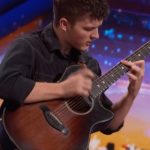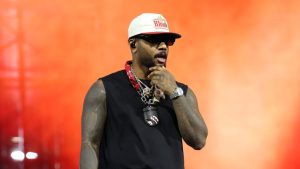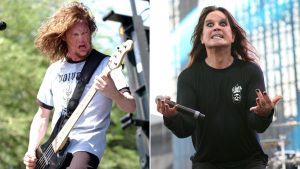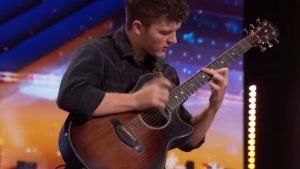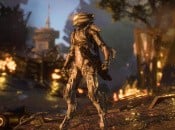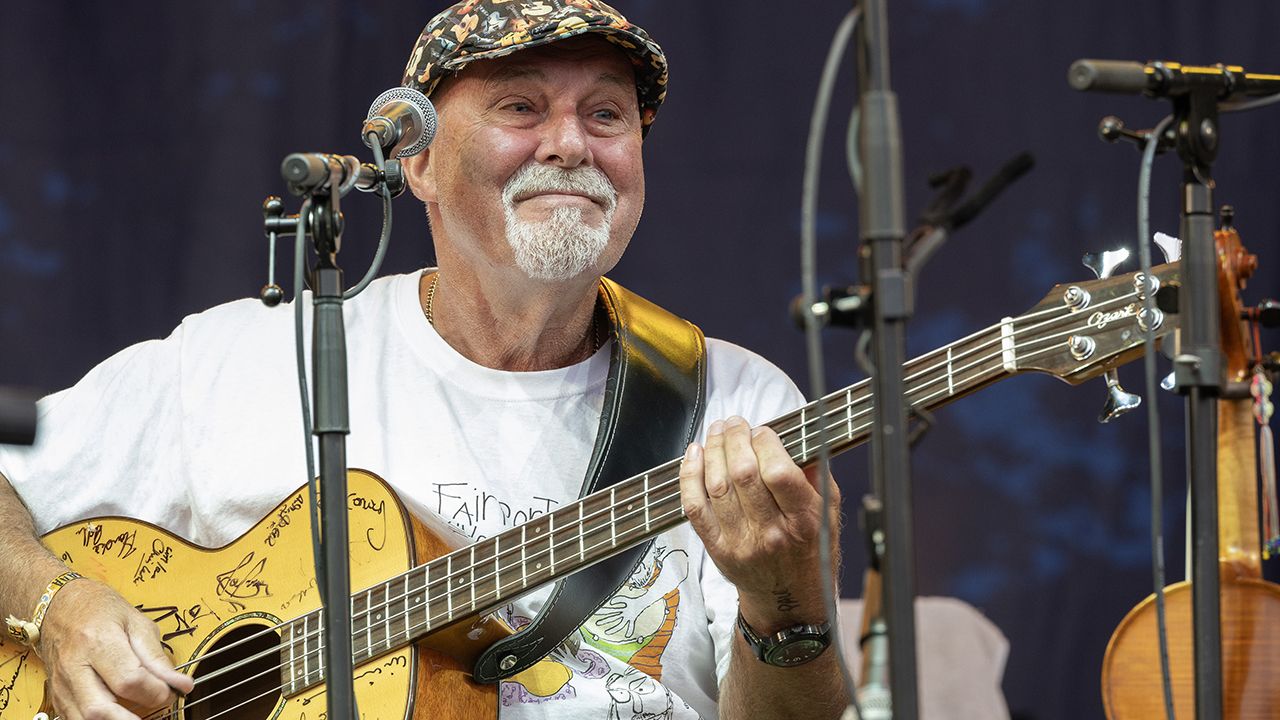
“It was painful for me to listen to Ian Anderson’s voice. I felt for him a lot”: Dave Pegg on why he quit Jethro Tull, beating Metallica to a Grammy, gigging with John Bonham and working with Nick Drake in a smelly squat
(Image credit: Steve Thorne, Getty Images)
Dave Pegg has played bass with Fairport Convention, Richard Thompson and Jethro Tull – but among the dozens of albums he’s been involved with, Nick Drake’s Bryter Layter satisfies him the most. “It’s such a moving album,” he say of the 1971 release. “It’s the one I listen to the most. It’s great.”
That’s high praise considering Pegg played on Jethro Tull’s 1987 album Crest of a Knave, which famously beat Metallica to a Grammy. “They’d had 50,000 t-shirts printed, I think, saying, ‘Grammy Award Winners,’” he laughs. “All they could do was use them to clean their cars, of which I imagine they had several!”
He left Tull in the mid-’90s, focusing solely on Fairport Convention. It all started when he switched from guitar to bass many years ago. “I got more fun out of being in a group playing bass,” he says. “The responsibility wasn’t being out front, shaking your ass and coming up with incredible solos.
“When I meet young people who say, ‘I’m thinking of taking up guitar,’ I tell them, ‘Just take up the bass – it’s so much easier. And as far as I know, you get the same money!”
How did the switch to bass happen?
“I was playing blues guitar and in rock bands in Birmingham [England], where there was a big band called the Uglies, fronted by Steve Gibbons, and they were auditioning for a lead guitarist.
“I went along but about 10 other guitarists were there, so I knew I had no chance. Then Steve Gibbons said, ‘Do you play bass? We’re looking for a bass player.’ I said, ‘I’d love to have a go – but I don’t have a bass.’
All the latest guitar news, interviews, lessons, reviews, deals and more, direct to your inbox!
“He said, ‘Our bass player who’s leaving is selling his 1962 Fender Precision for £70. If you get that you’re in!’ I’ve played bass ever since, and I kept that ’62 Precision for a long time. I still own guitars but I’m not really a player anymore.”
Is it true you were in a band with Robert Plant and John Bonham before Led Zeppelin?
“It’s a figment of Robert Plant’s imagination! Robert did have a band, The Band of Joy, but I was never in it with Bonham at the same time. Robert and I had a meeting in a pub in Birmingham, and discussed how we were going to be this great band – but that’s as far as it went.
“I never really played in a band with Robert, but was in a band with Bonzo. He was an incredible drummer, even in those early days. He was so good, but so loud, which meant we only did about 12 gigs. We never got rebooked! They were basically gigs in pubs and they’d always say, ‘Can you turn the drums down?’”
Given your friendships with Robert and John, were you ever considered for Led Zeppelin before John Paul Jones became involved?
“No. I’m sure Bonzo would have had a go, but I was no competition for John Paul Jones, who, next to Herbie Flowers, was the top session bass player in England. If Herbie couldn’t do a session, John Paul Jones got the call.
There’s an awful lot of right-hand technique going on in terms of Nick’s picking style
“And he’s much more than a bass player – his arranging, keyboard, and mandolin skills are to what you want to hear him play. He’s an all-round great musician; much better than I was, or would ever be.”
When you replaced Ashley Hutchings in Fairport Convention, you brought a very different musical approach with you.
“I’d come from more of a rock background, I suppose. I’d also been playing upright bass very badly for about 18 months with the Ian Campbell Folk Group; so when I joined Fairport, it was the dream band for me because they had this folky influence. Fairport is credited with making the first folk rock album in England; for me it was such a joy.”
(Image credit: Harry Herd, Getty Images)You added jigs and reels into your bass playing, which became standard in folk rock and folk punk thereafter. How did you come up with that?
“I take great delight in being credited with it – but it’s all basically a lack of knowing what else to play on those tunes! There’s a medley selection in the song Dirty Linen; it was four traditional tunes that Dave Swarbrick put together.
“I hadn’t a clue how to find a bass part, so Swarb said, ‘Why don’t you just play the tunes, Peggy? I’m sure you’ve got enough technique.’ Being young, foolish and hairy, I had a go – and people said it was revelatory! I’ve kept quiet about the fact that I didn’t know what else to do until today!”
What was it like working on Nick Drake’s Bryter Layter?
“It was incredible. I was living in a disused pub called The Angel in the countryside. The fashionable thing was to ‘get it together in the countryside,’ so all 13 of the Fairports were living in this hovel, with one bathroom and some wives, and I had my daughter there too. Nick came up for a few days to run through the songs and work out some sketchy arrangements.
“What you hear is basically what went down in the studio. The way he recorded, his guitar playing, it’s so intricate. There’s an awful lot of right-hand technique going on in terms of his picking style. Most of the guitar and vocals were done at the same time, because it was impossible to separate them.
“He was just an amazing guitar player. We never knew whether he was happy or not because he was a very introverted guy. We couldn’t tell whether he was getting off on what you did or not. But it still stands up in my book. It’s exactly the kind of music I love to play.”
What led to your joining Jethro Tull in 1979?
“John Glascock, Tull’s bass player, had a tooth infection that he never got looked at, which led to a worse illness, and he couldn’t do a tour. Richard Digance told them, ‘Iif you’re looking for a bass player, you should have a go with Dave Pegg.’
It arrived in two pieces. The plastic had separated from the base. but it’s still like, ‘I’ve got a Grammy!’
“That’s how I got the audition. It was just to a seven-week tour while John was recuperating. But on the last gig in San Francisco, we heard the sad news that John had passed away. He was much loved by the band, and they were so upset. But that’s how I got to stay.”
What was it like working with Ian Anderson?
“Ian kind of changed the lineup of the band altogether. He kept me and Martin Barre on, and I stayed for another 13 years. It was an incredible band to play with – Ian worked everybody so well, utilizing us to the best of our abilities. He’d always bring out the best in your playing. I haven’t had many bosses in music, but I must say that guy was a real inspiration to me.”
(Image credit: Ross Gilmore, Getty Images)Did your bass rig change when you moved from Fairport to Tull?
“Tull had a kind of light and darkness in its music. In those days they was doing big stadiums of 10,000 to 15,000 people. I was using Randall Amplifiers; I had about eight 12-inch speakers in two cabinets, and a couple of 15-inch speakers. It was a huge setup – we were very loud onstage compared to American bands.”
Was it a shock Tull beat Metallica for the Best Hard Rock/Metal Performance Vocal or Instrumental with Crest of a Knave?
“It still makes me laugh! I’ve got the only Grammy in Banbury in Oxfordshire. It’s on my fireplace shelf. I’m so happy with it – despite the fact that it arrived in two pieces. The plastic had separated from the base. but it’s still like, ‘I’ve got a Grammy!’”
Since Jethro Tull wasn’t in attendance, how did you find out?
“I got a call at four o’clock in the morning from one of my friends who lived in New York, saying, ‘You’re not going to believe this…’ We knew we’d been nominated but we all went, ‘There’s no way Jethro Tull is going to get that.’”
Why did you leave Tull in the ’90s to focus on Fairport Convention?
“There was no falling out, but I left because Ian lost his voice. He began to have real problems, through no fault of his own. We had to keep low in the keys for all the songs; he still suffers a lot with his voice.
Budapest (2005 Remaster) – YouTube
Watch On
“It was quite painful for me to listen to Ian. I just felt for him a lot. His guitar playing and his flute playing, as ever, were brilliant. He still worked his slabs off, performing and entertaining the audience, but it was because of his voice that I left, really.”
You’ve been with Fairport ever since. What’s next?
“We have the festival which we’ve been organizing for over 40 years. It’s in Cropredy, the little village where I used to live in the middle of Oxfordshire. We’ve had so many great people on it; it’s not a ‘folk festival’ – it’s very eclectic. Other than that, what I’m doing is having a rest!”
The 2025 edition of Fairport’s Cropredy Convention takes place on August 7-9.
Andrew Daly is an iced-coffee-addicted, oddball Telecaster-playing, alfredo pasta-loving journalist from Long Island, NY, who, in addition to being a contributing writer for Guitar World, scribes for Bass Player, Guitar Player, Guitarist, and MusicRadar. Andrew has interviewed favorites like Ace Frehley, Johnny Marr, Vito Bratta, Bruce Kulick, Joe Perry, Brad Whitford, Tom Morello, Rich Robinson, and Paul Stanley, while his all-time favorite (rhythm player), Keith Richards, continues to elude him.




